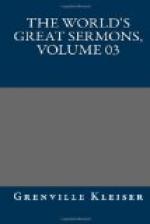With the stability which Messiah’s Godhead communicates to His throne, let us connect the stability resulting from His Father’s covenant.
His throne is founded not merely in strength, but in right. God hath laid the government upon the shoulder of His holy child Jesus, and set Him upon Mount Zion as His King forever. He has promised and sworn to build up His throne to all generations; to make it endure as the days of heaven; to beat down His foes before His face, and plague them that hate Him. “But my faithfulness,” adds He, “and my mercy shall be with him, and in my name shall his horn be exalted. Hath he said it, and will he not do it? Hath he spoken it, and shall it not come to pass?” Whatever disappointments rebuke the visionary projects of men, or the more crafty schemes of Satan, “the counsel of the Lord, that shall stand.” The blood of sprinkling, which sealed all the promises made to Messiah, and binds down His Father’s faithfulness to their accomplishment, witnesses continually in the heavenly sanctuary. “He must,” therefore, “reign till he have put all his enemies under his feet.” And altho the dispensation of His authority shall, upon this event, be changed, and He shall deliver it up, in its present form, to the Father, He shall still remain, in His substantial glory, a priest upon His throne, to be the eternal bond of our union, and the eternal medium of our fellowship with the living God.
Seeing that the throne of our King is as immovable as it is exalted, let us with joy draw water out of that well of salvation which is opened to us in the administration of His kingdom. Here we must consider its general characters, and the means by which it operates.
The general characters which I shall illustrate are the following:
1. Mystery. He is the unsearchable God, and His government must be like Himself. Facts concerning both He has graciously revealed. These we must admit upon the credit of His own testimony; with these we must satisfy our wishes and limit our inquiry. To intrude into those things which he hath not seen because God has not disclosed them, whether they relate to His arrangements for this world or the next, is the arrogance of one vainly puffed up by his fleshly mind. There are secrets in our Lord’s procedure which He will not explain to us in this life, and which may not perhaps be explained in the life to come. We can not tell how He makes evil the minister of good; how He combines physical and moral agencies of different kind and order, in the production of blessings. We can not so much as conjecture what bearings the system of redemption, in every part of its process, may have upon the relations of providence in the occurrences of this moment, or of the last. Such knowledge is too wonderful for us: it is high, we can not attain it. Our Sovereign’s way is in the sea, and His path in the deep waters; and His footsteps are not known. When, therefore, we are surrounded with difficulty,




